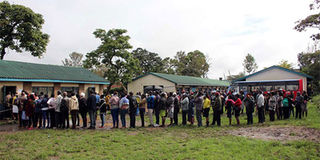Election has eroded credibility and legitimacy of leadership

Voters queue at Morrison Primary School in Nairobi to cast their vote during the repeat presidential election on October 26, 2017. The election eroded legitimacy and credibility of leadership. PHOTO | DENNIS ONSONGO | NATION MEDIA GROUP
What you need to know:
After deriding the opposition for wanting “nusu mkate” (forced shared government) the Jubilee Party ended up with a mandate that was only endorsed by only about a third of the voters.
Even the casting of ballots was reminiscent of (former President Daniel arap) Moi’s mlolongo (queue-voting) system, as everyone knew who was voting (or not voting) for whom.
What we have now is a government that lacks legitimacy and which has to contend with a citizenry that is deeply divided.
It is, regrettably, no exaggeration to say that we are living in an era of irrationality, deception, confusion, anger and unfocused fear – an ominous combination, with few precedents.
These words by Noam Chomsky, one of America’s leading thinkers, could as well sum up the state of Kenya today.
The repeat presidential election last week plunged the country into the throes of an unidentified illness, one that has made some of us blind, turned others deaf and caused deep anxiety in others.
I don’t think it would be an exaggeration to say that the October 26 presidential election was a charade.
What else can one call a process where a leading candidate boycotts the election and where about two-thirds of the electorate decides not to vote? In such a scenario, any victory is hollow.
ELECTION
The election has been described as “a vote of no confidence”, but it could also be described as an act of mass civil disobedience.
Its outcome is akin to a loveless marriage, a forced union that can only breed resentment or end in bitter divorce.
After deriding the opposition for wanting “nusu mkate” (forced shared government) the Jubilee Party ended up with a mandate that was only endorsed by only about a third of the voters.
Even the casting of ballots was reminiscent of (former President Daniel arap) Moi’s mlolongo (queue-voting) system, as everyone knew who was voting (or not voting) for whom.
What we have now is a government that lacks legitimacy and which has to contend with a citizenry that is deeply divided.
PUZZLING
Many international observers had said that postponing the election with a view to making the process more credible would have been a wiser option.
As a Washington Post editorial warned prior to the October 26 poll, “a nominally elected Mr Kenyatta will be left with a weakened domestic mandate and a lack of international credibility”.
There were many things wrong with this election.
The puzzling non-availability of two Supreme Court judges on a crucial date that would have determined whether to stop or delay the election was one among the many bizarre things that occurred.
Kenyans were surprised to learn that judges of the Supreme Court can go AWOL without the knowledge or authorisation of the president of the court, and at a time when the court’s expected decision was so critical.
SUPREME COURT
Kenyans will always wonder whether this was irresponsible behaviour on the part of Justices Njoki Ndung’u and Smokin Wanjala or whether this was part of a larger plot to scuttle the bid to postpone the election.
Has the Supreme Court – Kenyans’ last bulwark against injustice – been intimidated or compromised?
If it has, then we are in for a difficult period, with or without the unshakeable Chief Justice David Maraga.
Some Jubilee supporters argue that those who did not vote in this election are just sore losers who do not understand what impact a delayed election would have had on the economy.
ECONOMY
There is no doubt that the economy has slowed down because of the disputed August 8 election and its aftermath.
But going ahead with another election managed by a flawed electoral body poses an even bigger threat to the economy because it risks generating political instability.
Even Bloomberg, a publication that is influential in the financial circles, cautioned that holding an election on October 26 would be a “historic mistake”, given that many of the issues that led to the calling of this fresh election had still not been resolved.
These issues, include the public’s lack of trust in the Independent Electoral and Boundaries Commission’s ability to carry out a free, fair and credible election, a perception that was strengthened by commissioner Roselyn Akombe, who cited various anomalies in how the IEBC conducts its business after she fled the country and resigned.
IEBC
The mysterious murder of ICT manager Chris Msando was another sign that not everything was above board at the IEBC.
Some reports have also suggested that the local and foreign companies that were contracted to manage the electronic transmission of results were compromised, which could then explain why the IEBC has yet to make its servers available for scrutiny, as ordered by the Supreme Court.
These issues strike at the very heart of our fragile democracy and may come to haunt us in the future.
Like the controversial 2007 and 2013 elections, this latest poll is likely to further divide an already deeply polarised nation.





